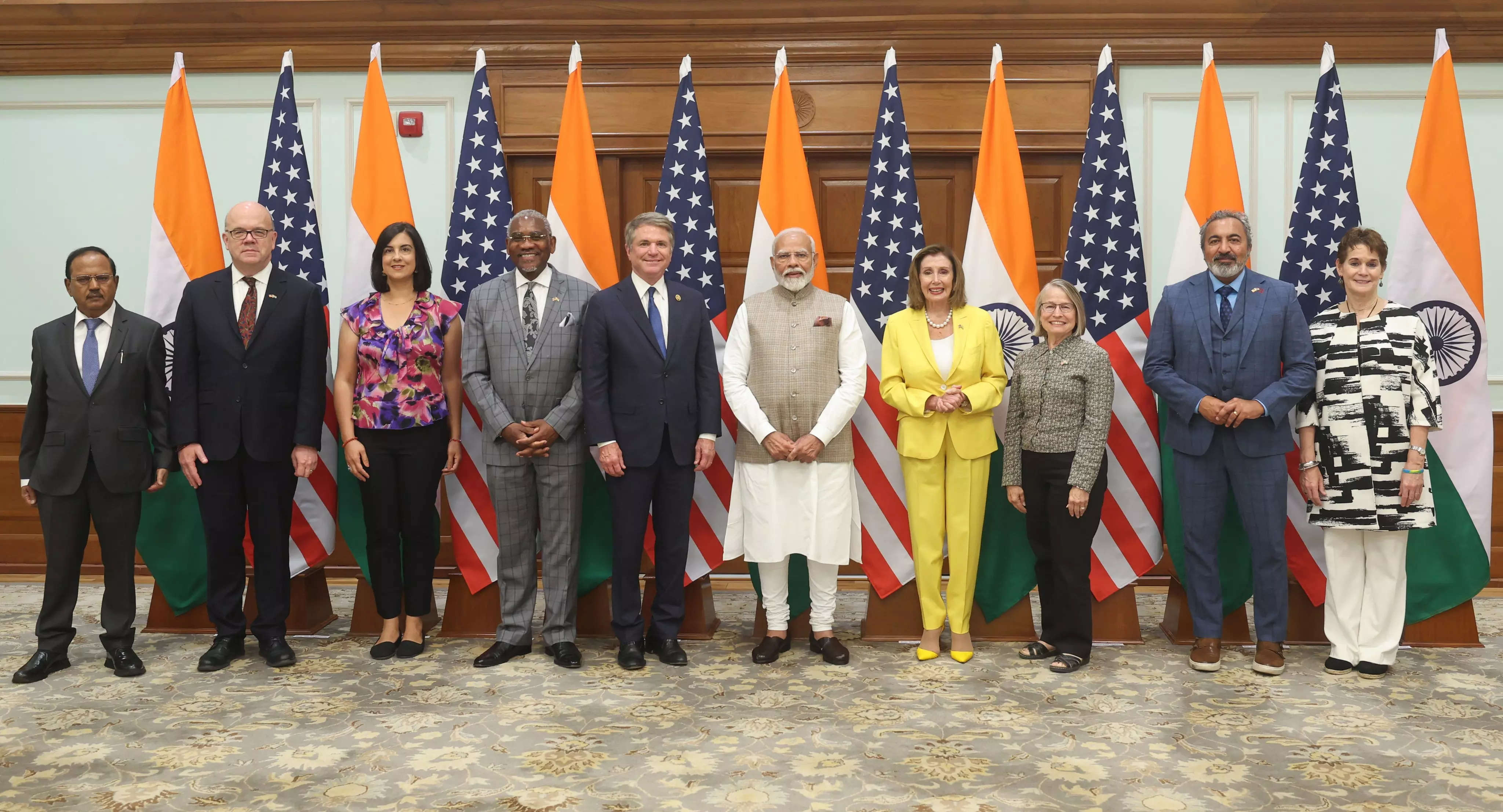TOI News Desk
Driving the news
- PM
Narendra Modi June 20 met the bipartisan group of US lawmakers who visited Dharamshala this week and called on the Dalai Lama. The delegation, led by House Foreign Affairs committee chairman Michael McCaul and former House Speaker Nancy Pelosi, was also hosted by foreign minister S Jaishankar on Wednesday night upon their return from Dharamshala. - The delegation’s visit to Dharamshala drew criticism from China, with Beijing urging the Americans to fully recognize the “anti-China separatist nature of the Dalai group,” honor commitments the US has made to China on issues related to Tibet, and stop sending the wrong signal to the world. Their meetings with Indian leaders will likely raise further concerns in China.
Why it matters
- The meeting highlights India’s efforts to up the ante on Tibet and Taiwan, both of which are sensitive issues for China.
- India’s increasing engagement with Taiwan and Tibet reflects a broader strategy of multi-alignment, where India pursues its national interests independently.
- The strategic partnerships with Taiwan and the symbolic support for Tibet are seen as ways for India to assert its position on the global stage without being overly dependent on any single power.
- This approach also allows India to strengthen its economic and technological capabilities while countering China’s regional influence.
- Harsh Pant, an international relations professor at King’s College London, told the South China Morning Post: “India has once again indicated that it is willing to gradually ramp up pressure on issues like Tibet and Taiwan.”
- Michael Kugelman, director of the Wilson Centre’s South Asia Institute, noted that India seemed to be “trying to signal that it can use its relationship with the US as leverage.” He added, “It can show China that there are ways that it can push back.”
- Kugelman said that Modi’s hosting of the delegation was a “very explicit signal” that New Delhi was “fully” behind the delegation’s audience with the Dalai Lama, and that it wasn’t just “politely” facilitating it.
- “India appears more risk tolerant now when it comes to how far it’s willing to go with pushing the Tibet issue,” Kugelman said.
The big picture
- India-Taiwan relations: India has been strengthening its economic and technological partnership with Taiwan, particularly in the semiconductor industry.
- Taiwanese companies such as Powerchip Semiconductor Manufacturing Corp (PSMC) and Foxconn are expanding their operations in India, with significant investments in Modi’s home state of Gujarat.
India-China tensions : Relations between India and China have been fraught since the 2020 border clashes, which resulted in the deaths of 24 soldiers. Both nations have been ramping up their military presence and infrastructure along the disputed border, leading to heightened tensions.- US support for Tibet: The bipartisan Resolve Tibet Act, recently passed by the US House of Representatives, aims to pressure China into resuming talks with Tibetan leaders. This legislation, supported by prominent figures like Nancy Pelosi, underscores the US commitment to addressing human rights issues in Tibet.
Zoom in
- Technological collaboration: The partnership with Taiwan in semiconductor manufacturing is crucial for India’s technological advancement. The collaboration is not just about economic gains but also about reducing dependency on China for critical technologies.
- Border tensions: The ongoing military buildup along the India-China border highlights the fragile nature of their relationship. Any significant engagement with Taiwan or Tibet by India is likely to be viewed by China as a direct challenge to its sovereignty and influence in the region.
- US-India-China triangle: The US support for Tibet and India’s growing ties with Taiwan can be seen as part of a larger strategy to counter China’s rise. This trilateral dynamic adds a layer of complexity to the geopolitical landscape, with each country maneuvering to protect its interests.
- India’s actions, while provoking China, also signal a strong stance on maintaining its strategic autonomy and advancing its national interests in the face of regional challenges.
What they are saying
- US lawmakers: “We will not let [China influence the Dalai Lama’s succession],” said Michael McCaul, leader of the delegation, highlighting the bipartisan support for Tibet’s autonomy. Nancy Pelosi also emphasized the message of the Resolve Tibet Act, saying it signals to China that “things have changed now.”
- China’s response: Beijing has strongly condemned the US delegation’s visit, urging Washington to recognize the “anti-China and separatist nature of the Dalai clique” and avoid any form of contact with it.
- Chinese foreign ministry spokesperson Mao Ning reiterated that “Taiwan is an inalienable part of the territory of the People’s Republic of China” and protested against India’s interactions with Taiwan.
- “If China is not paying attention to our red lines, why do we have to pay attention to China’s red lines?” Sana Hashmi, a fellow at a Taipei-based think tank, told Foreign Policy on India’s changing stance on Taiwan-China relations.
- Experts like Tanvi Madan of the Brookings Institution note that India’s engagement with Taiwan aligns with its technological goals and search for like-minded partners. “Modi has had this general attitude that ‘if I’m doing something with a country, why am I hiding it?’” Madan told FP, pointing out that he was the first Indian prime minister to visit both Israel and Palestine.
What next
With President Joe Biden expected to sign the Resolve Tibet Act, the geopolitical dynamics in Asia are poised to become even more complex.India’s continued engagement with Taiwan and Tibet will likely provoke further reactions from China.
(With inputs from agencies)



